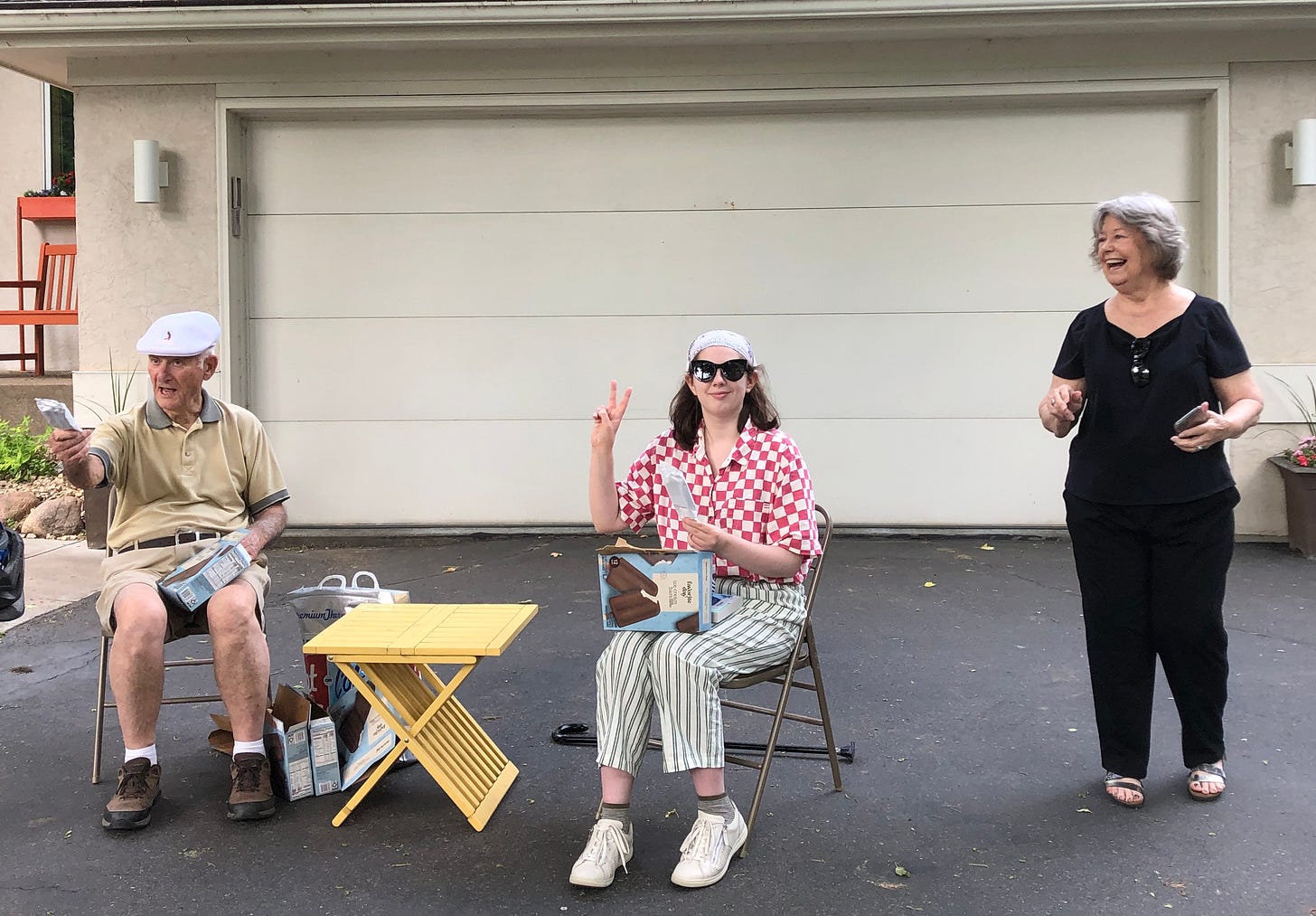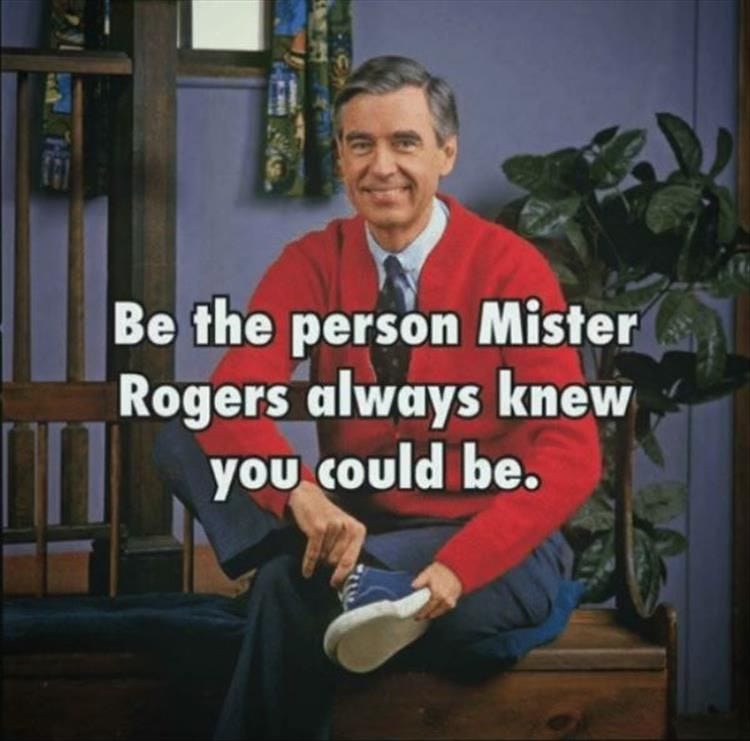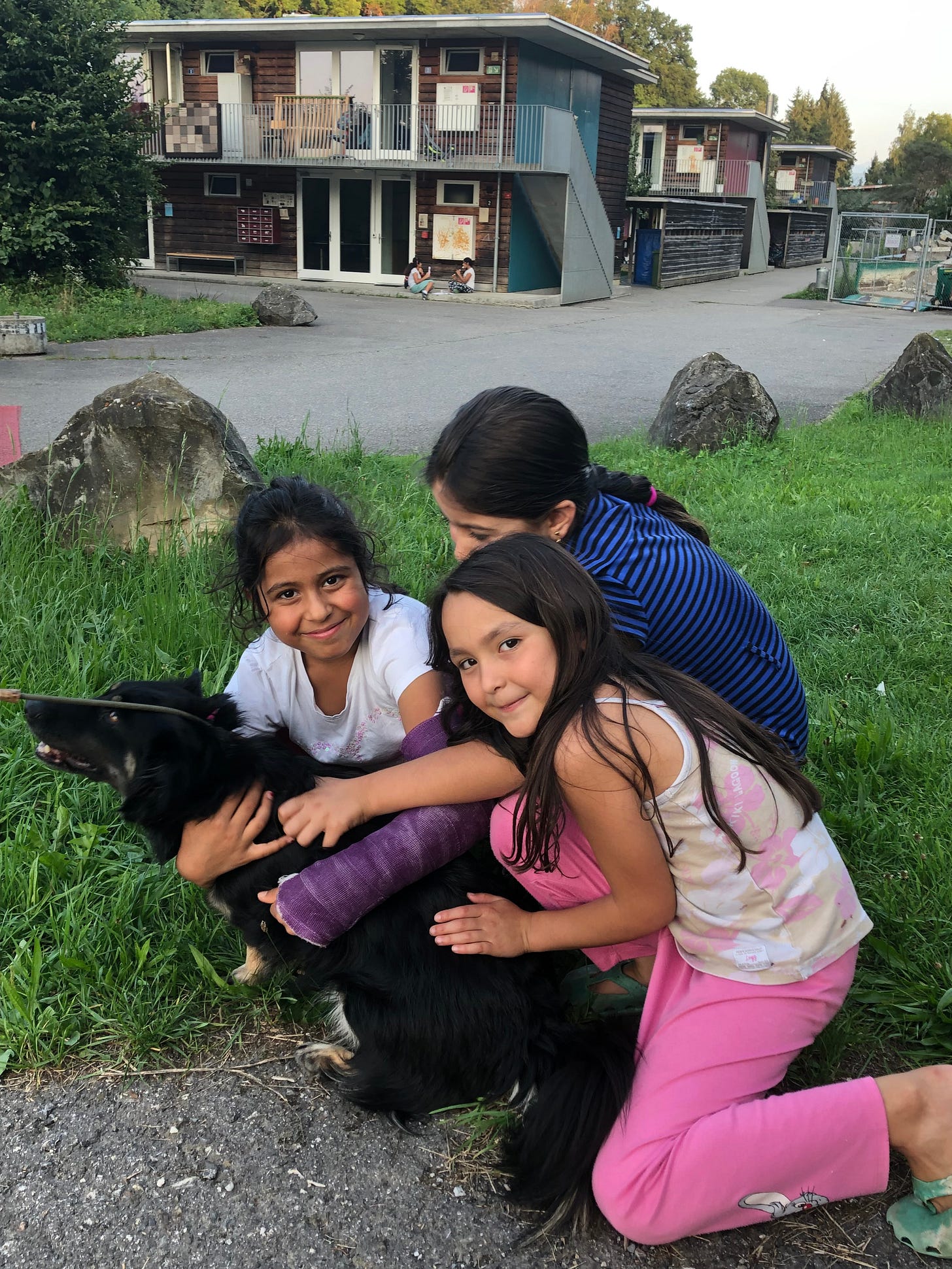March 20 is Mr. Rogers’s birthday. As I have written before, I think the US should honor Mr. Rogers by establishing National Mr. Rogers Day—a holiday where we try our best to act as Mr. Rogers would.
We love Mr. Rogers for his ability to listen with focus and patience. We admire him for his courage—for example when he successfully testified before Congress to obtain funding for national public television. We are warmed by his love for all human beings—for example when he tells Jeffrey in his “fancy chair” that “it’s you I like . . . the way down deep inside you, not the things that hide you.”
We tear up when he encourages our emotional authenticity and gratitude—for example at an award ceremony, when he asked for ten seconds of silence so that everyone could take time to remember “special ones who have loved us into being.” Readers, let’s take those ten seconds right now.
. . .
I believe that the world would be a better place if we dedicated this one day to following Mr. Rogers’s example and being a good neighbor to everyone who crosses our path. If we spend this one day listening and acting with courage, warmth, love, authenticity, and gratitude, we may discover that we want to continue. What better way to honor Mr. Rogers!
The Pragmatic Case for Being a Good Neighbor
Naysayers may wonder why, with all the need that is out there, I am saying that we should honor Mr. Rogers by merely being a good neighbor, rather than by engaging in some grander project. It might feel as though just being a good neighbor is a cop-out. And yet when we’re confronted with the tremendous suffering around the world, we can become overwhelmed and discouraged. We might want to help, but where would we even begin? And we’re so busy already—who among us would want (or be able) to turn our lives upside-down to dedicate ourselves wholeheartedly to repairing the world?
The reason for being a good neighbor, as opposed to attempting monumental, self-sacrificing acts of charity, is that we will actually do it. Being a good neighbor is a manageable challenge: It “is not too baffling for you, nor is it beyond reach. It is not in the heavens. . . . Neither is it beyond the sea” (Deut. 30:11-13). It is right outside our front door. As Tolstoy said,1
Remember then that there is only one important time, and that time is now. The most important one is always the one you are with. And the most important thing is to do good for the one who is standing at your side.
Or, as the wisdom attributed to Teddy Roosevelt has it, “Do what you can, with what you’ve got, where you are.”
The Selfish Case for Being a Good Neighbor
In fact, when we are good neighbors, we get back in return much more than we have given, which encourages us toward more kindness and generosity going forward. One benefit to us, which is so obvious that it almost goes without saying, is that when we help others, we feel happy. We bask in the glow of our neighbors’ grateful smiles, and we enjoy feeling useful. But neighborliness has subtler benefits too.
We Learn to Notice
It is tempting to go through life oblivious to the challenges and struggles of others. We hunker down and dash around, neglecting to meet the eyes of the people near us. We might be afraid that if we see their suffering, we will be caught up in more than we can handle. Or we just forget, say, to glance up from our phones and to cast our eyes around the subway car to see if a senior or a pregnant woman could use our seat.
But when we commit to being a good neighbor, we start noticing what needs doing, and we realize that we are fully capable of the small kindnesses that ease the lives others. Noticing and then acting is a spiritual practice that makes us finer people.
Here are a few examples of what I mean.
The window at our kitchen table looks out on the entrance to our building. Often when we are having dinner, we will see our elderly neighbor, Annemarie, carrying bags of groceries, and my husband, Matt, always leaps up and runs out to take them in for her.
Our son, Noah, and daughter, Casey, never avert their eyes from the homeless people they encounter. They always make a point of going up to say hello, to give them some spare change, and—of course—to pet their dogs. Noah lives in an area where there are so many homeless people that if he were to give money to everyone who asked, he would bankrupt himself. So he has worked out a system: He allocates $10 per week for giving to panhandlers. He gives his spare cash whenever he is asked until he hits his limit. After that he is still friendly to panhandlers, but he tells them he is all tapped out for now.
We have deputized our dog, Lynn, to help our neighbors too. One night as we walked past the temporary refugee housing near us, Matt noticed that the kids were looking at Lynn longingly, so we brought her over to be petted and fed treats. We learned that one of the girls had to leave her dog behind in Syria and missed him terribly. Lynn provides the kids some snuggles and a little comfort.
A few years ago, shortly after Annemarie’s partner died, Casey looked out the window and said, “Oh look! Miss Annemarie is outside with the Little Polar Bear [the nickname of her dog, a white Lab]. I wonder if she’s lonely?” So Casey went outside to keep her company. Casey brushed the Little Polar Bear, and she and Annemarie chatted for an hour or so. Annemarie still talks about what a special time that afternoon was for her.
These modest examples illustrate that it is a simple matter to look around us and then take care of what needs doing. As Noah’s system shows, even though the need around us may be great, we are always able to help in some small way. We may not to be able to do everything, but we can do something, and something is more than nothing.
Readers, what is something you do to be a good neighbor?
We Join a Virtuous Circle
Our generosity sets a good example for others, who may be inspired to kind acts of their own thanks to us. (Take Matt, who gives spare change to panhandlers “in honor of Noah and Casey.”) Even better, when we help our neighbors, we discover that they return the favor—and then some. Here are a few more stories:
When Matt was studying for the German exam he needed to pass for his permanent residency, Annemarie invited him upstairs to spend several afternoons drinking tea and practicing his German with her. Seems like a good trade for carrying in her groceries once in a while!
I wrote recently about my parents’ dog-treat stand in their front yard. They also treat the whole community to an ice-cream party every year on the last day of school. The party has been a much-loved neighborhood event for almost twenty years.

Their neighbors have responded to my parents’ generosity in kind. A year ago last fall, my dad became gravely ill from complications after routine surgery. While he was in the hospital, a crowd of neighbors came over and raked my parents’ yard—no small task, given that my parents have about a hundred trees. The neighbors cleaned up the whole property and sent several heartwarming photos to my parents. The photos cheered my parents up to no end—even more than their relief at not having to tackle the leaves themselves, they got a kick out of how happy the neighbors looked as they raked.
Readers, do you have a story of a virtuous circle, where you were kind to someone and they reciprocated?
My friend Sarah recently wrote about a man in her neighborhood, Chris Hyde, who makes soup every day, which he gives away for free to anyone who wants some. His generosity has set off a cascade of kindness. In Sarah’s words,
He has legions of friends in the neighborhood who donate vegetables from their gardens or past-shelf-date-but-still-good foods from their workplaces. The food bank gives him day-old sandwiches from the local Starbucks to hand out with the soup. He has a setup for Grocery Outlet gift cards and another where you can help him out with his electric bill.
His story made the local news:
Before his “epiphany,”2 Chris had been “borderline depressed,” and the world had seemed “dark and divided.” He decided to create “a sacred circle of giving and receiving,” and, as he says, “I don’t think I’ve ever been happier in my entire life.” Hopefully Chris’s story will inspire us to similar acts of generosity in our own neighborhoods. Chris’s advice? “Don’t worry. Just take action. Just start it.”
A Word about Politics
I have long thought that we could learn from the ethic of emergency room doctors and nurses. When there is a shooting and the ER fills up with injured people, the doctors and nurses don’t play judge and jury. They don’t concern themselves with who is the shooter and who is the victim. They stick to their job, which is to treat all patients to the best of their ability and to triage them based not on their morality, but rather on the urgency of their need. Given that doctors don’t make moral distinctions when offering care, a fortiori we ought to ignore political opinions—which, all claims to the contrary, are not life or death—in our encounters with others.
We have the power to stop arguing and to treat everyone with equal dignity and charity. Sarah tells of how, after the soup Facebook group blew up with political arguments,
[Chris] deleted all the political comments and made a single post telling people he’d be zero-tolerance on this in the future—he didn’t have time to moderate or decide what kinds of political comments were acceptable, because every minute he did that was a minute he wasn’t making soup to give to people, and he refused to allow anything that implied his soup was only for people with certain political views. No political views on his page since. What a mensch.
Like Chris and Mr. Rogers, we should think of everyone as our neighbor, not just those who are in our tribe. I’ll share the following story on this topic for your edification, even though I don’t come off particularly well in it. One day many years ago, we got a call from a friend who lived across the street in our New Jersey town. She asked whether Matt could help another neighbor, whom I’ll call Judy, solve a problem with her computer. Matt and I privately referred to Judy as Vince Foster Woman because she had seemingly never encountered a right-wing conspiracy-theory rabbit hole she didn’t fall into, including the eponymous one. I asked Matt if he really wanted to help Judy, and he looked at me, aghast. “She needs something fixed on her computer, and I can fix it. Of course I’m going to help her!”
Duly chastened, I called Judy to set up a time when Matt could come over. When I told her who we were, there was a long pause, and then she said, “Oh, I know who you are. You’re those Democrats.” And she did not mean it as a compliment. I was THIS CLOSE to saying, “Oh, just forget it” and hanging up. But I stifled this baser impulse and arranged a time for Matt to go over and fix her computer. The day after he set everything up, Judy called me back, this time in tears. She thanked me and Matt profusely and said she was greatly moved by Matt’s kindness.
The story has a final, sobering, twist. A few months later, Judy died. I learned that she had been battling brain cancer, and that Matt had restored not only her computer but also her faith in people. Imagine how I would have felt if I had let politics get in the way of helping someone in need. I keep Judy’s story in mind whenever I am tempted to snap at someone whose beliefs are different from mine. We don’t always know the troubles other people may be carrying; our job is to relieve, not add to, their burdens.
How about you, readers? What will you do today to be a good neighbor and to honor Mr. Rogers? Please share your thoughts in the comments!
The Tidbit
Did you know that Mr. Rogers was an accomplished jazz pianist? When I was in high school, I used to watch Mr. Rogers’ Neighborhood to enjoy the music (and also, secretly, his gentle kindness). Mr. Rogers composed the music for his show, and it was performed, live, by the jazz pianist Johnny Costa. The music on Mr. Rogers’ Neighborhood was complicated and different in every episode; Mr. Rogers trusted children to be able to pay attention and appreciate it. The video below is a fascinating (and jazzy!) introduction to a little-known side of Mr. Rogers and his show.
This is a paraphrase of a passage from Tolstoy’s story “The Emperor’s Three Questions.” The version quoted here comes from The Three Questions, by Jon J Muth.
All quotes in this paragraph are from the video.






It’s my only free evening this week - I’m going to celebrate Mr. Rogers Day by having some of Chris’ soup for dinner and donating to his grocery fund. What he calls “being part of the sacred circle of giving and receiving.”
This was a really lovely read that's made me unexpectedly weepy, so while I'd very much like to share some kind of touching story or more bolstering comment, I'm forced to instead leave it at that and go blow my nose ❤️